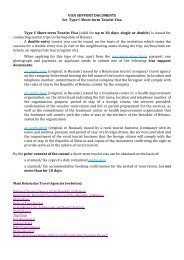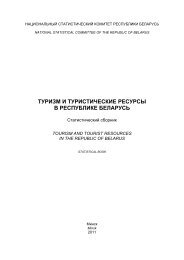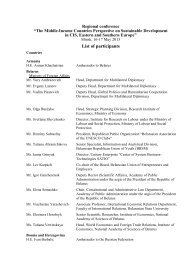Human Development Report 2013 - UNDP
Human Development Report 2013 - UNDP
Human Development Report 2013 - UNDP
You also want an ePaper? Increase the reach of your titles
YUMPU automatically turns print PDFs into web optimized ePapers that Google loves.
practice. Even under autocratic governments,Egypt and Tunisia, for example, had fairlywell developed associational structures andself- disciplined political opposition movements.By contrast, Libya lacked such experience,which contributed to an all-out civilwar. Building political cohesion after conflictis difficult in countries that lack a traditionof civic participation. Diverse experiencesshow that changes in political regimes do notautomatically enhance voice, participation, inclusionor accountability or make states workmore effectively.Accountability and inclusion are vital notonly in the political sphere, but also in economicand social areas, through promotingjob creation and social inclusion, especially insocieties with a large and growing educatedpopulation. This requires effective mediatinginstitutions; otherwise, modernization canbe destabilizing. 22 This is not to suggest thatpeople should be educated only if there arejobs for them—in the human developmentparadigm, access to knowledge and educationis an end in itself—but recent social upheavalsshow that a mismatch between education andeconomic opportunity can lead to alienationand despair, especially among young people.Of the 20 countries with the largest increasesin mean years of schooling over 1980–2010,8 were in the Arab States (figure 4.2). In mostof these countries, employment opportunitiesfailed to keep pace with educational attainment.Most countries that were part of therecent unrest in the Arab States are in the lowerright quadrant of figure 4.2, because they hadmajor gains in educational attainment butbelow-median employment to populationratios. 23It is hard to predict when societies willreach a tipping point. Many factors precipitatedemands for change. When educatedAccountability andinclusion are vital not onlyin the political sphere,but also in economic andsocial areas, throughpromoting job creationand social inclusionFIGURE 4.2In most countries, employment opportunities have not kept pace with educational attainmentEmployment to population ratio (%)85 Qatar8075United Arab Emirates70656055BahrainMEDIAN50454035SudanSyrian ArabRepublicMoroccoYemenIraqLibyaSaudi ArabiaEgyptTunisiaJordanAlgeria302520MEDIAN-1 0 1 2 3 4 5 6 7Change in mean years of schooling, 1980–2010 (years)Select Arab StatesOthersNote: Analysis covers 141 countries. Employment to population ratios are for the most recent year available during 2006–2010.Source: Adapted from Campante and Chor (2012) using updated data.Chapter 4 Sustaining momentum | 93
















